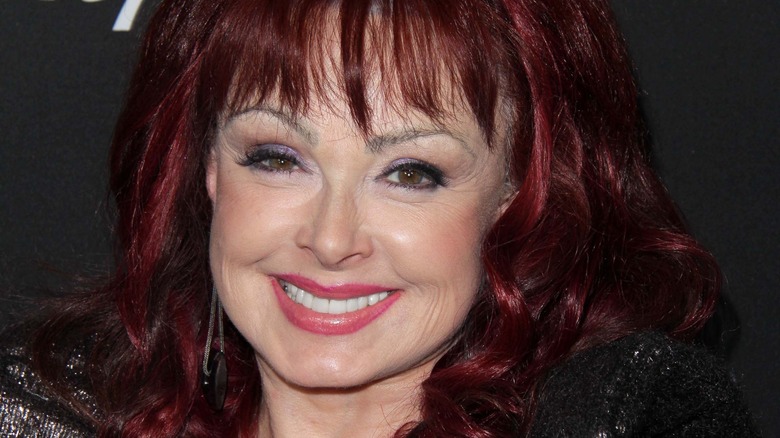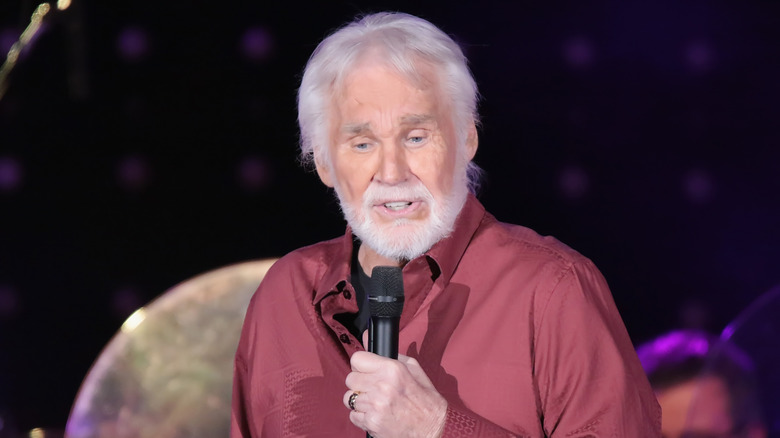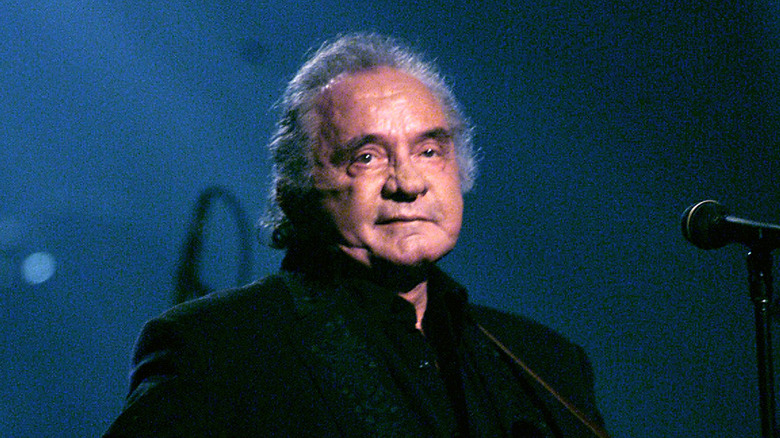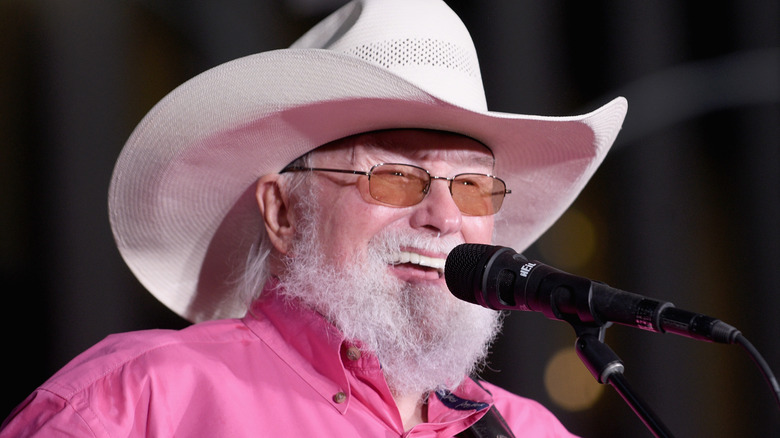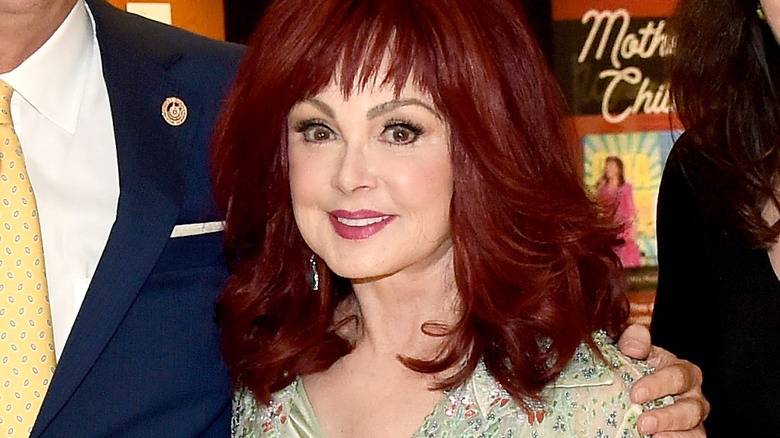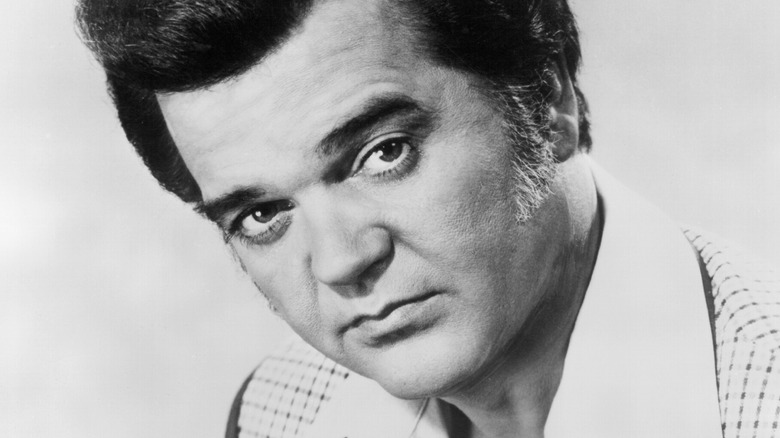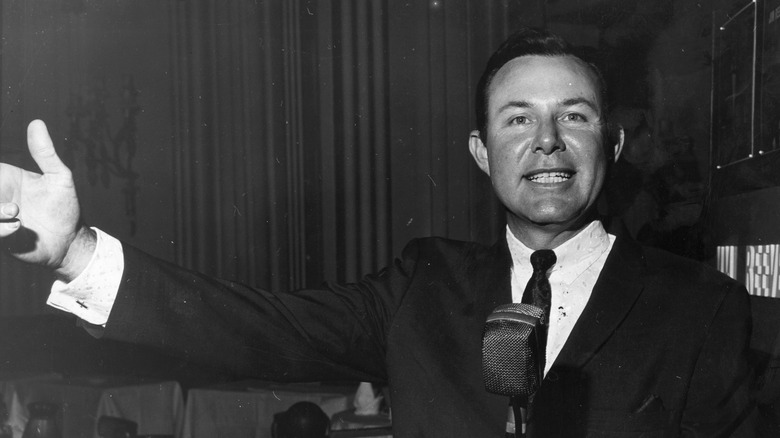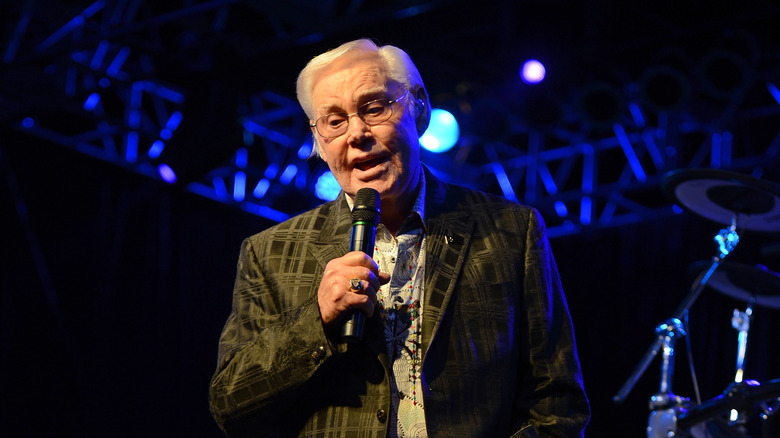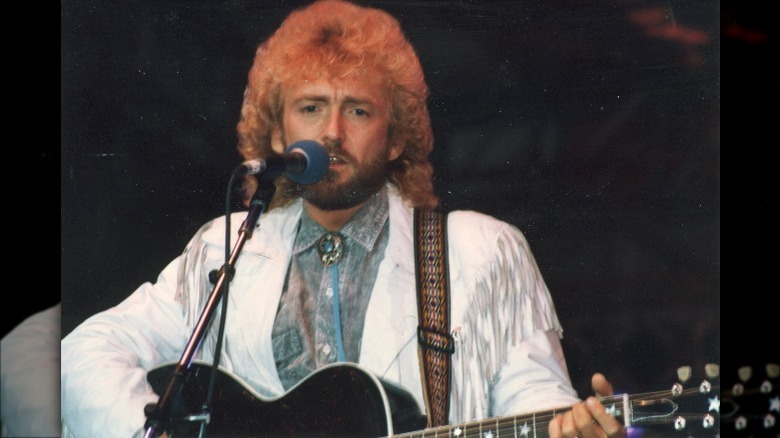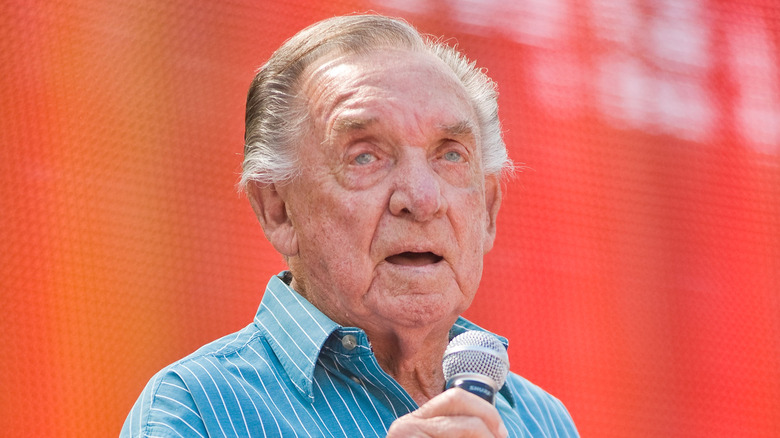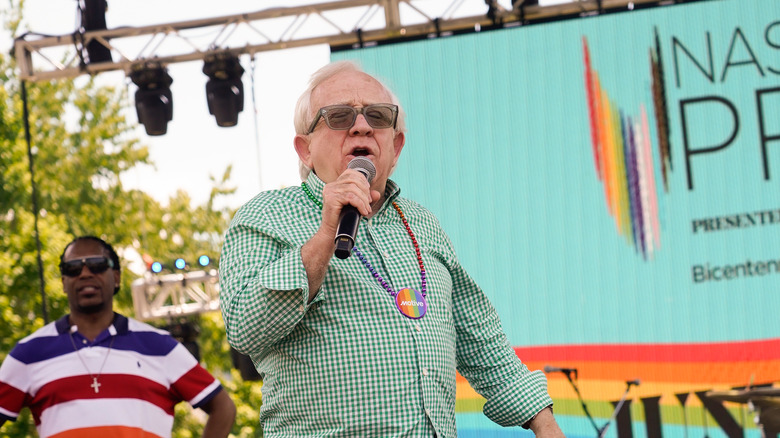Final Interviews Of Country Music's Biggest Stars
No one can tug the heartstrings like a classic country musician. They know just the right lyric to sing in the most aching tone to bring a genuine tear to your eye. Much of the best country music is about painful subjects like heartache and death, so when a county music star dies, it's like they have been trying to prepare you for it all along.
And while once these stars pass on they leave lots of great music behind them to enjoy, in many cases, they also leave behind other meaningful words in the form of their final interview. Sometimes, they sit down with a journalist knowing that they are dying. Other times, they are already advanced in years and their death is less surprising. But in the most tragic circumstances, they give interviews having no idea they are about to die long before what should have been their time.
Whether poignant or funny, looking back on their lives or looking forward to a future that wouldn't be, here are the final interviews of some of country music's biggest stars.
Kenny Rogers
Kenny Rogers died of natural causes on March 20, 2020, at age 81, so while he was getting up there in years, there was no reason for him to think he was giving one of his last print interviews when he spoke to Closer. The much-married Rogers told the outlet that despite his time wedded to Janice Gordon (1958-1960), Jean Rogers (1960-1963), Margo Anderson (1964-1976), and Marianne Gordon (1977-1993), "I think the years with [my fifth wife] Wanda have been the most rewarding. That's no offense to any of the other people I was married to. I just think I wasn't ready before."
While it's not clear if the Closer interview was his last print one, his appearance in the TV episode "Biography: Kenny Rogers" was his final on-camera interview. There, he talked about where his love of music came from. "My father played fiddle, and all his brothers and sisters played instruments," Rogers said. "They would all get on the front porch and play, and all the family would sit out in the yard."
The documentary also covered his childhood living in poverty, but as Rogers told Closer, even once he was well-off and successful, he knew what was really worth something: "I've had a lot of things in my life. I've made loads of money and had the biggest and best of everything, but now I'm back to looking at the small things that matter: my boys. Wanda. It's not about me anymore. It's about them."
Johnny Cash
There are country stars, and then there's Johnny Cash. The Man in Black was one of the biggest the genre ever saw. Or, as Kurt Loder put it when he conducted what would be Cash's final interview in 2003, "You've been a star forever, and you're still as big a star as you've ever been." But Cash's life was far from charmed: His brother died young, he had a complicated first marriage, and he underwent several arrests for misdemeanors, among other tragedies. His second marriage to June Carter, a successful musician in her own right, was always held up as a beautiful love story, however.
It was after his wife's death that Cash recorded the songs Loder was interviewing him about, including Cash's incredibly moving cover of "Hurt" by Nine Inch Nails. Cash told Loder that while he normally disliked the process of making music videos, he'd enjoyed working on the one for that song because he "felt we were doing something worthwhile." Those who watched the tearjerking video will remember Cash at home, with the "ghost" of his late wife, as well as pictures and videos from their time together.
As for his long and sometimes controversial music career? "You can't let people delegate to you what you should do when it's coming from way in here, you know?" Cash said while pointing toward his heart. "I wouldn't let anybody influence me into thinking I was doing the wrong thing by singing about death, hell, and drugs."
Charlie Daniels
While Charlie Daniels had career highlights that included playing with Bob Dylan, his name will forever be connected to just one song: "The Devil Went Down to Georgia." A hit that is so big that even the biggest country music hater probably knows all the words, and its success dwarfs everything else in Daniels' decades-long career.
In his later years, one of the things Daniels also became known for was his unabashedly right-wing political opinions, so it's not surprising that his final on-camera interview ended up being on Fox Nation (a streaming service supplement to Fox News), specifically the show "The Pursuit! with John Rich." It was also a fitting final sit-down since Rich is a country star himself, and he revealed the existence of the as-yet-unaired interview a few days after Daniels died, tweeting, "I was blessed to give the last interview of our hero, Mr. Charlie Daniels."
In the sit-down, Daniels talked about his philosophy on life, growing older, and seizing the day. "If you do something you don't like, if you're doing some kind of work you don't like, stop doing it ... find something you like to do or you're always gonna sit on the front porch in a rocking chair after you get old and gray and wonder why you didn't join the circus when it came through town. You never know when something's gonna happen," Daniels said.
Daniels died on July 6, 2020, of a hemorrhagic stroke. He was 83 years old.
Naomi Judd
Naomi Judd was the matriarch of a performing dynasty. With her daughter Wynonna, The Judds' "Greatest Hits" album spent a whopping 97 weeks on the Billboard 200 chart. Tragically, Judd died by suicide on April 30, 2022, aged 76.
Judd gave what would end up being her final interview to CBS News, specifically, she showed "Inside Edition" correspondent Megan Alexander around her home in Tennessee. However, because she died before the segment was broadcast, "Inside Edition" only showed viewers a couple of short snippets of Judd speaking. She leaned in to say to the camera, "You came to see me!" And when shown walking across a paddock, she points out the locations of her daughter's homes, "Ashley's right over this hill over there. Wynonna's over that hill right there."
Other than some undistinguishable comments run underneath a voiceover by Alexander, that's all that was released of Judd's words in her final interview. Instead, it was up to Alexander to fill the world in on what else they had talked about, from Judd's many awards to "how close she was to her daughters, how they could pop over at any time, walk in the front door and ask what's for dinner." Alexander also shared that Judd had seemed happy on that day just weeks before she died, proof that suicidal people do not fit a single stereotype.
If you or anyone you know is having suicidal thoughts, please call the National Suicide Prevention Lifeline by dialing 988 or by calling 1-800-273-TALK (8255).
Conway Twitty
While some millennials might only know Conway Twitty from extended "Family Guy" gags, he was astonishingly successful, with 55 No. 1 singles — the most of any country artist to that point — and record sales of more than 50 million. So it's unsurprising that in his final interview (via Country Rebel), given in 1993 (the year he died), Twitty was looking forward to more hits and more sales, all thanks to his relationship with his fans. "When a country singer reaches a point, if he ever does, where a fan trusts him, deal with those feelings and emotions, sometimes they let 'em stay around for a long time, maybe 35, 36 years, maybe longer," Twitty said.
Considering what was to come, some of his words are eerie in hindsight. Twitty said poignantly, "There's a natural order to things. And the natural order is for things that have been around a long time to go away, and for new things to live and grow and to take the place of that." He also talked about his slowly advancing age, saying, "Age is a state of mind, anyway. There's nothing wrong with aging a little bit. There's something wrong with getting old. And I don't intend to do that."
While he probably meant he didn't intend to age mentally, Twitty would not age anymore physically, either. He had finished one performance and was traveling to another when he died of a stomach aneurysm, at the age of 59.
Jim Reeves
Jim Reeves was one of country music's biggest stars in the 1950s and '60s. He might have gone on to be successful with new music in later decades as well, but tragically he died in a plane crash in 1964. Reeves was piloting the small plane, and his only passenger was his manager, Dean Manuel. When they hit a severe storm, it's believed Reeves got disoriented, ending in a deadly crash. He was 39.
Reeves obviously had no idea his time was almost up when he gave what would be his final interview. The country star found himself in a little bit of controversy, so a reporter from Country Song Roundup called him to get his side of the story, as recorded in "Jim Reeves: His Untold Story" by Larry Jordan. Apparently, a miscommunication on a USO tour had led to rumors that Reeves and other musicians refused to play a concert at one of the bases in Germany. Reeves quickly explained that wasn't the case at all, and that playing at the base had never been on the itinerary.
Turning to other topics, the interviewer asked how Reeves felt about the up-and-coming band out of Britain. He said, "Well, I have nothing against the Beatles. They have something or they wouldn't be popular. They can sing, they can play, and their hair is long. They have talent, brains, and direction. But my place is not with the Beatles or even in their category of music."
George Jones
For such a major star, George Jones' final interview was surprisingly intimate. A reporter from Country Weekly came with Jones to an event at his grandchild's school in 2013, where he took questions from teenagers, who were unknowingly the final people to interview the country legend. Jones covered topics as wide-ranging as his sobriety, aging, and the car crash that almost killed him in 1999.
The most relevant information for the students was probably when Jones spoke about his history with music. He explained how he'd found a love for it as a child: "I'd take my guitar and hide it in the woods and cover it with leaves, and before I'd make it to the schoolhouse, I'd go back and get my guitar and sit by one of the trees and pick." The sort of music he loved then was still his favorite, even if the style had moved on. "These kids nowadays, they're liking this halfway pop-rock stuff. I don't blame them. Everything changes every few years. But I'll always love the traditional country music. And they have a right to like what they like. But I'm sorry, I don't like it — I like some of it, I really do, but most of it, it sounds a lot alike."
Jones also spoke about plans for a major concert that year with a huge lineup of guest stars. However, six months before the planned event, he was hospitalized and died in April 2013, aged 81.
Charley Pride
Being one of the few successful Black country music stars in the 1960s would be enough of an achievement for Charley Pride, but his life was full of them, from being a self-taught musician to serving in the military to being so good at baseball he almost ended up doing that as his career instead. Once he did choose music, he racked up hit singles, record sales, and Grammy awards.
In 2020, Pride received his due for his incredible career from the Country Music Awards when they gave him a Lifetime Achievement Award. Backstage, he took questions from reporters in what would be his final interview (via Taste of Country). Pride spoke about how the musician Chet Atkins saw his potential early on: "I learned so much from him. I had only been in the studio about three times in my whole life [when I met Atkins]. He said, 'Charley, these songs we're recording right now, you're gonna be able to play 'em in 50 years and they'll love 'em just as much as [now.]' I said, '50 years?!'" As for which of his many, many songs was Pride's favorite? "I'll tell you, and this is the truth: The one I'm singing in the moment," he said.
Tragically, exactly one month and one day after receiving that great honor from the CMAs, Pride became one of the victims of the COVID-19 pandemic. He died on December 12, 2020, aged 86.
Keith Whitley
The New Country movement in the 1980s had a rising star in Keith Whitley. While he was very successful for almost two decades before his death in 1989, the 34-year-old never got the chance to get as big as he could have. His cause of death was alcohol poisoning, which made the topics he covered in his final interview — which wouldn't be published until 1996 — even more heartbreaking.
Whitley told Country Music International journalist Alan Cackett about the dangers of finding success in a group as young as Whitley did: "I was just 15 years old and I was being treated like a star." The demands of touring contributed to his addiction issues. Whitley said, "...the road work was real tough. We had to stay in cheap motels, four or five to a room, and often we'd travel five or six hundred miles between dates. I guess that was when I started to drink. We all did, but when I hit that bottle, I didn't stop until it was all gone."
The musician said his drinking kept his career from moving to the next stage more than once. "Every time I'd get close to something happening, I'd get drunk," he said. "It took me a long time to realize that my drinking had become a problem."
If you or anyone you know needs help with addiction issues, help is available. Visit the Substance Abuse and Mental Health Services Administration website or contact SAMHSA's National Helpline at 1-800-662-HELP (4357).
[Featured image by Vistadeck via Wikimedia Commons | Cropped and scaled | CC BY-SA 2.5]
Ray Price
Ray Price was very aware his time was coming to a close when he gave his final interview to Rolling Stone in December 2013. He'd been fighting cancer for years but had decided to enter hospice care. In a farewell message to his fans, Price said he was at peace with dying. However, that didn't mean the process was easy. "It's been pretty tough," he told the publication. "I haven't been able to work all year. Just laying in bed that long makes everybody weak, no matter how old or young you are."
Price looked back on his career, where he learned from the likes of Hank Williams, and later had many men in his own band who went on to become big stars — not least of which was Willie Nelson. "I've been lucky in a way — all of my boys were great players," Price reflected. "You can't be a great player if you don't have a great heart. If you ain't doing it for the people, you're doing it for something else." Talking about his long relationship with Nelson, Price said, "We're sort of like brothers in a way, we always help each other out when we can."
But while others heaped praise on him, Price was humble about his success. "I don't really think of it that way. I just like what I've done and how it's worked out. It's been great ... I haven't lost my voice, thank God for that."
Leslie Jordan
While many people who are familiar with Leslie Jordan probably know him as a scene-stealing character actor from dozens of shows and films, including "Will & Grace" and "American Horror Story," he also found late-in-life success as a country star.
He gave what would be his final TV interview to CBS Mornings, explaining how this shocking turn of events came about: social media combined with people in lockdown during the pandemic. "I had a Sunday Instagram hymn singing where we would just sing these old hymns that I grew up with, and people started tuning in," Jordan said, somewhat understating the millions of views and followers he had at that point. "And so, somehow from that, we decided to make an album." As for if he ever saw something like this happening? No, Jordan said, it was "so unexpected, just to happen, you know, in my 60s."
But he was clearly enjoying himself and appreciated how in music, he wasn't pigeonholed into a certain role that he'd long been in Hollywood. "I'm a country music singer now," he said happily. "I love Nashville and the way that Nashville embraced me and to be taken kind of serious. And to have made an album with Dolly Parton, Chris Stapleton, Brandi Carlile. You know, that's something."
Tragically, Jordan died in a car accident on October 24, 2022. He was 67.
